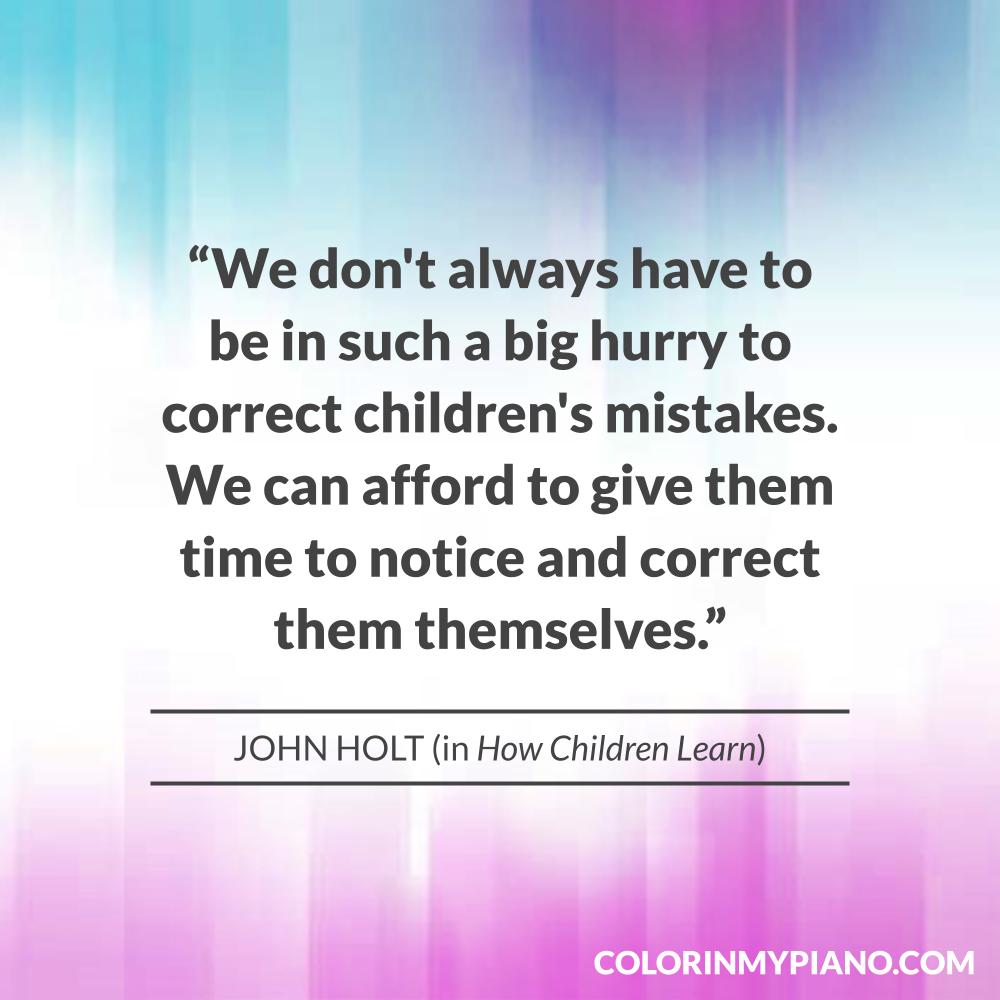
“We don’t always have to be in such a big hurry to correct children’s mistakes. We can afford to give them time to notice and correct them themselves.”
–John Holt (in How Children Learn)
Today’s food for thought: What would happen if we weren’t so quick to make corrections of young children? What potential benefit is there to allowing others time to notice and correct their own mistakes? Does this apply only to young children, or for older students as well?
Share your thoughts in the comments below!


This is something virtual teaching helped me with! When there’s a delay, you can’t jump in so fast. As things have opened up more here and I’m in a more hybrid teaching situation with some in person lessons, I’m trying to keep that aspect-keeping quiet unless there is a ton of struggling, and commenting at the end. Sometimes if the same mistake is made multiple times, I’ll mention it before they get to the end. But it’s been good for me to learn to wait a bit longer, jot down thoughts so I don’t forget, and then address them all together instead of interrupting.
I love that, Melinda! A good example of finding the silver lining with online teaching. 🙂
I love this! A lot of times the kids know when they have made a mistake. I think when I immediately correct the mistake for them, they could justifiably feel criticized. I like it best when I can mention what I loved about the piece and ask them to play it again ( if it’s a short one!). Often they self-correct on the second playing!
Yes! Great points, Mary.
I love when my students start noticing their own mistakes! Also, I will sometimes let a minor mistake slide if I know they really understand the concept and just missed it that once. It is often a brain battle between over critique and not wanting to give a false sense of accomplishment.
Yes. I think there are many examples of times where it’s smart to let minor mistakes slide. We have to be discerning as teachers to know when to correct and when to let mistakes go!
I so agree with what all has been said. I stopped correcting my students so much online because sometimes it was so difficult for them to hear what I said due to the delay in sound bytes, and trying to get my point across in their Zoom lesson. So, I would just take notes and wait until they had finished their piece, and then I would suggest to them how they might try to play a certain measure; or I would ask them what measure(s) they were having difficulties playing. This small adjustment has saved me and my students valuable time in making their piano lessons more enjoyable and productive.
Great example, Barbara. Thanks for sharing this!
We feel so compelled to stamp out “mistakes” because WE were taught that making mistakes is a bad thing. I think I would have quit lessons had I not found a teacher that specialized in improvisation, jazz and music theory. Who knew that I’d find my calling as an improv pianist? Don’t get me wrong, I still had to learn my classical pieces note-for-note, but having the improv “outlet” made me love piano lessons. I took for another nine years and now I’m in the music business! SO thankful for that more relaxed environment.
Great perspective. Thanks for sharing this, James!